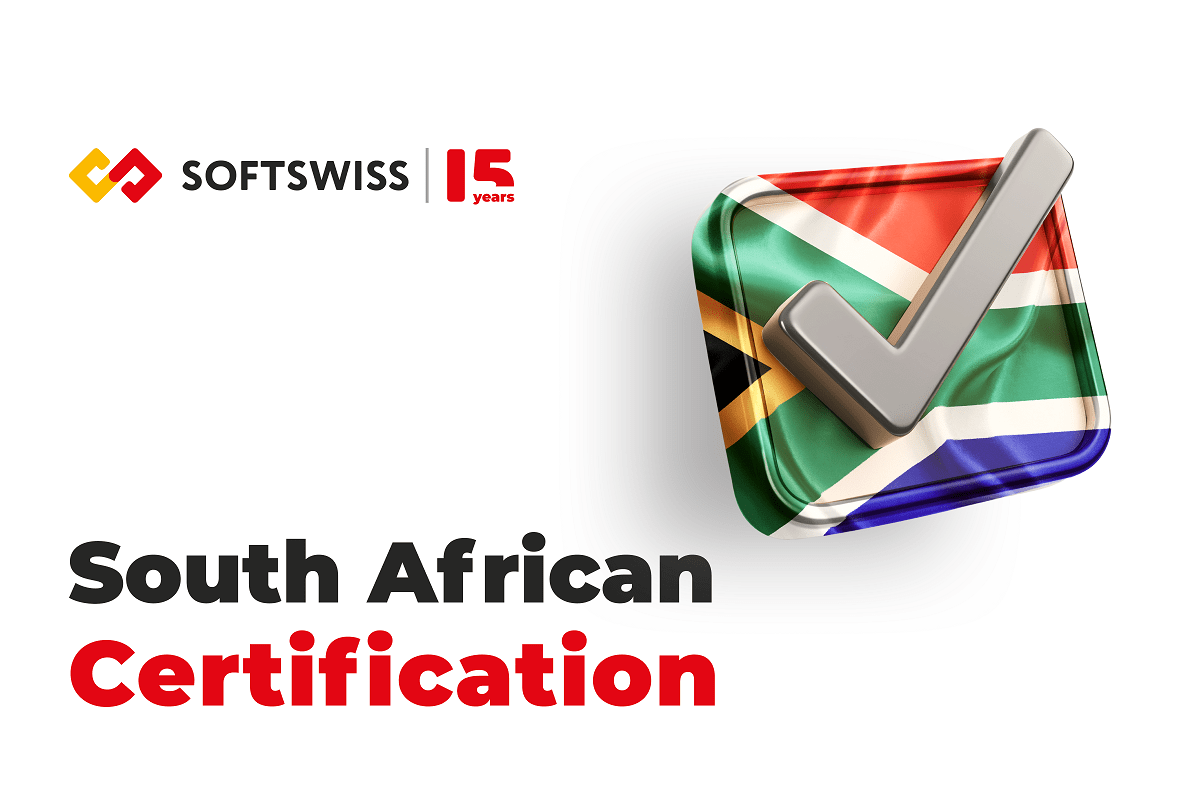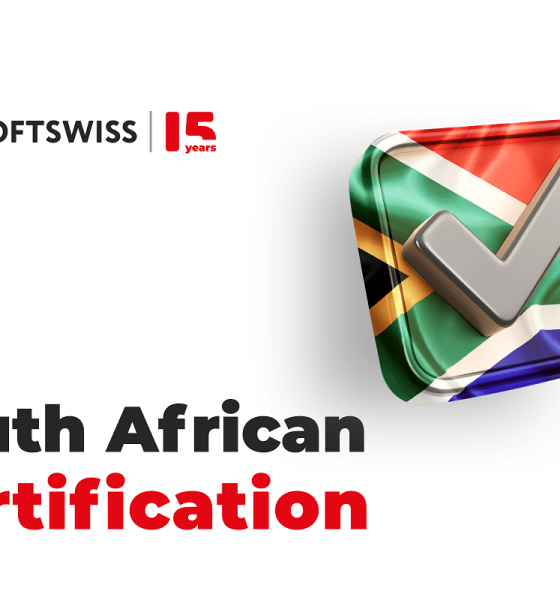

Africa
SOFTSWISS Expands in South Africa with New Certifications
SOFTSWISS, a leading software supplier for the iGaming industry, announces its successful South African certification. The company has secured a Letter of Certification (LoC) from the National Regulator for Compulsory Specifications (NRCS) for its Casino Platform and Sportsbook, now certified under the South African B2B manufacture licence.
This licence was initially obtained by Turfsport, a seasoned South African software supplier with 35 years of industry experience. Earlier this year, SOFTSWISS strategically acquired a major stake in Turfsport, aligning their product portfolios. With this certification, SOFTSWISS expands its offerings in the burgeoning South African market.
Vitali Matsukevich, Chief Operating Officer at SOFTSWISS, comments: “South Africa will be one of the key markets for SOFTSWISS in the coming years. It has immense potential, driven by increasing internet penetration, lower mobile internet costs, and affordable mobile devices. Additionally, the local audience shows a strong interest in gambling, which further supports our decision to expand here.”
According to the InfoQuest survey, sports betting is the most common form of gambling in South Africa, with people placing bets on sports about 12 times a month on average. Casino gambling and horse betting are most popular on weekends, while lottery and online betting happen throughout the week because they are easily accessible online. The survey also reveals that the average gambler engages in three different types of gambling multiple times a month, underscoring the significant role of gambling in South African society.
The recently published SOFTSWISS South African market review highlights a growing interest in esports and fantasy sports, particularly among younger, tech-savvy demographics. Statista reports that 51% of South African survey participants are interested in esports betting, while the National Gambling Board (NGB) notes that 39% are inclined towards fantasy sports betting, especially in popular sports like soccer, cricket, and rugby. These trends align with global patterns and suggest a promising future for these sectors in the region.
The comprehensive SOFTSWISS South African market review is available for free and offers valuable insights into these emerging trends.
About SOFTSWISS
SOFTSWISS is an international tech company supplying software solutions for managing iGaming projects. The expert team, which counts over 2,000 employees, is based in Malta, Poland and Georgia. SOFTSWISS holds a number of gaming licences and provides one-stop-shop iGaming software solutions. The company has a vast product portfolio, including the Online Casino Platform, the Game Aggregator with thousands of casino games, the Affilka affiliate platform, the Sportsbook Platform, and the Jackpot Aggregator. In 2013, SOFTSWISS was the first in the world to introduce a Bitcoin-optimised online casino solution.
The post SOFTSWISS Expands in South Africa with New Certifications appeared first on European Gaming Industry News.
Africa
African iGaming Alliance Appoints Former Botswana Regulator Peter Kesitilwe as CEO

The African iGaming Alliance (AIA) announced the appointment of Peter Kesitilwe, former CEO of the Botswana Gambling Authority, as its first Chief Executive Officer.
The Alliance – founded by betPawa, Betway, 888Africa and Sportybet – was established to promote a responsible, well-regulated online betting and gaming industry across Africa. Its mission is to advance fair competition, consumer protection and sustainable regulatory and tax frameworks that support both growth and responsibility.
“I am deeply honoured to be appointed as the AIA’s first CEO. I look forward to working with regulators and policymakers to build a vibrant, sustainable & competitive industry that upholds the highest standards of responsible gambling and consumer protection,” said Kesitilwe.
Board members welcomed Kesitilwe’s appointment:
Anthony Prissman, Betway Africa : “Peter’s strong regulatory background and leadership experience bring immediate credibility to the AIA. We are excited to work with him to help shape a responsible industry across the continent.”
Dan Thomson, betPawa : “Peter’s appointment reflects the strength of the AIA and our mission to build a vibrant, well-regulated sector throughout Africa.”
Gregory Parsons, SportyBet: “The AIA was created to support balanced regulation and raise standards for responsible gambling. Peter’s leadership marks the beginning of this journey.”
Christopher Coyne, 888Africa: “Following a rigorous recruitment process, Peter’s vision for the future of iGaming in Africa stood out. We look forward to working with him and engaging stakeholders to deliver that vision.”
The AIA aims to be the voice of the online gaming industry in Africa, fostering collaboration between operators, regulators and governments to create a transparent, responsible and commercially sustainable sector.
The post African iGaming Alliance Appoints Former Botswana Regulator Peter Kesitilwe as CEO appeared first on European Gaming Industry News.
Africa
Racing1 is exhibiting for the first time at the Grand Prix D’Afrique

Full-service hub, uniting four content leaders of racing in 1/ST CONTENT, ARC, RMG and Tabcorp, is set to reinforce its existing racing alliance with SOREC at key Casablanca summit
Racing1, the brand name for the newly formed Strategic Alliance between 1/ST CONTENT, Arena Racing Company (ARC), Racecourse Media Group (RMG) and Tabcorp, is making its conference debut at the Grand Prix D’Afrique (11-13 September, Casablanca), thanks to its partners at SOREC (Société Royale d’Encouragement du Cheval).
The Grand Prix D’Afrique (GPA) has quickly become a must-attend annual event for African lotteries, organized by SOREC and run in conjunction with the African Lotteries Association (ALA). After three successful editions in Marrakesh, the GPA has now moved to Casablanca, Morocco’s economic capital, for this upcoming renewal.
Racing1’s compelling daily timetable of engaging racing action from around the world (UK, North and South America, Turkey, Morocco, Australia, New Zealand and South Africa) boasts a 24/7 chronology to seamlessly complement any lottery or sportsbook programme across any time-zone, supplying global partners with a reliable source of fast-settling betting content at varied viewing windows throughout diverse territories.
Via the Racing1 brand, 1/ST CONTENT, ARC, RMG and Tabcorp are deploying their combined expertise to deliver targeted, localised solutions that appeal to assorted audiences, whether they’re already familiar with racing, or new to the sport and in need of more educational content.
Simon Fraser, spokesperson for Racing1, said: “It’s great to welcome industry delegates to our new stand, where we are demonstrating how Racing1 has conveniently crystallised a once-entangled worldwide web of racing rights into one package, enabling simpler consumption which is crucial in emerging markets.
“Via Racing1’s subsidiary product, Racing1 Markets, we can also demonstrate our one-stop-shop 24/7 racing solution, available in one simple contract and integration via our new iFrame, or existing API solution.
“Racing can be complicated, particularly for those unfamiliar with the space, and a key driver behind Racing1 is to simplify integration and contractual efforts for customers, whilst offering a fully outsourced 24/7 industry-leading offering direct to platforms and operators. It also signals Racing1’s wider intent to return better value to racing’s key stakeholders through more international deals, not merely through the domestic operators where racing is seen as a more traditionally consumed sport.
“Stop by our stand to see how Racing1 benefits consumers and operators alike – with a complete racing package via one contract and one integration.”
The post Racing1 is exhibiting for the first time at the Grand Prix D’Afrique appeared first on European Gaming Industry News.
Africa
BetKing Renews Ikorodu City FC Partnership for 2025/26 NPFL Season

BetKing, Nigeria’s leading sports betting and digital entertainment brand under KingMakers, has renewed its official partnership with Ikorodu City Football Club for the 2025/26 Nigeria Premier Football League (NPFL) season.
This marks the third consecutive year of collaboration between both organisations, highlighting a shared commitment to grassroots development, youth empowerment and the growth of Nigerian football.
Since the partnership began in 2023, Ikorodu City FC, popularly known as the Oga Boys, has risen rapidly through the ranks, earning promotion to the NPFL in 2024 and finishing an impressive fourth place in their debut 2024/25 campaign.
Their season was highlighted by a record-breaking 6–0 victory over Katsina United, one of the most dominant results in NPFL history.
BetKing’s support for Nigerian sports extends far beyond football. The company recently commissioned a modern mini sports complex at Ifako Ijaiye, already serving over 400,000 community members, including neighbouring communities.
The post BetKing Renews Ikorodu City FC Partnership for 2025/26 NPFL Season appeared first on European Gaming Industry News.
-

 gaming3 years ago
gaming3 years agoODIN by 4Players: Immersive, state-of-the-art in-game audio launches into the next generation of gaming
-
EEG iGaming Directory9 years ago
iSoftBet continues to grow with new release Forest Mania
-
News8 years ago
Softbroke collaborates with Asia Live Tech for the expansion of the service line in the igaming market
-
News7 years ago
Super Bowl LIII: NFL Fans Can Bet on the #1 Sportsbook Review Site Betting-Super-Bowl.com, Providing Free Unbiased and Trusted News, Picks and Predictions
-
iGaming Industry8 years ago
Rick Meitzler appointed to the Indian Gaming Magazine Advisory Board for 2018
-
News7 years ago
REVEALED: Top eSports players set to earn $3.2 million in 2019
-
iGaming Industry8 years ago
French Senator raises Loot Boxes to France’s Gambling Regulator
-
News7 years ago
Exclusive Interview with Miklos Handa (Founder of the email marketing solutions, “MailMike.net”), speaker at Vienna International Gaming Expo 2018













